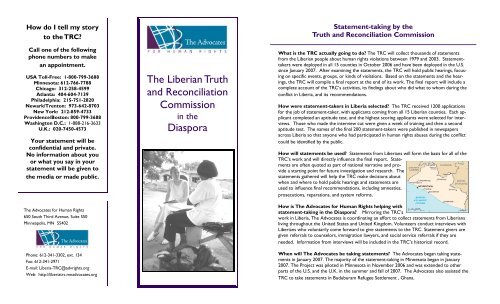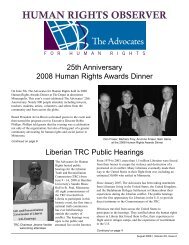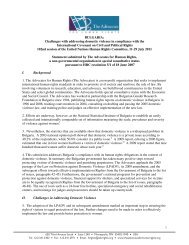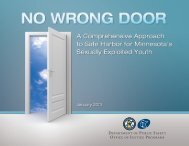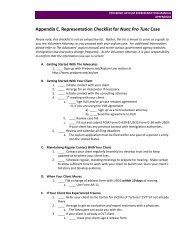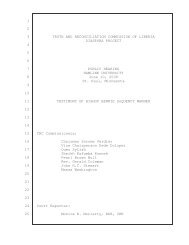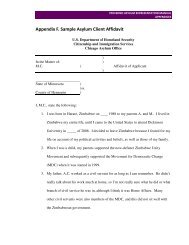FAQ Brochure 12-27-08 - The Advocates for Human Rights
FAQ Brochure 12-27-08 - The Advocates for Human Rights
FAQ Brochure 12-27-08 - The Advocates for Human Rights
You also want an ePaper? Increase the reach of your titles
YUMPU automatically turns print PDFs into web optimized ePapers that Google loves.
How do I tell my storyto the TRC?Call one of the followingphone numbers to makean appointment.USA Toll-Free: 1-800-799-3688Minnesota: 6<strong>12</strong>-766-7788Chicago: 3<strong>12</strong>-258-4599Atlanta: 404-604-7139Philadelphia: 215-751-2820Newark/Trenton: 973-642-8703New York: 2<strong>12</strong>-859-4733Providence/Boston: 800-799-3688Washington D.C.: 1-888-216-3633U.K.: 020-7450-4573Your statement will beconfidential and private.No in<strong>for</strong>mation about youor what you say in yourstatement will be given tothe media or made public.<strong>The</strong> <strong>Advocates</strong> <strong>for</strong> <strong>Human</strong> <strong>Rights</strong>650 South Third Avenue, Suite 550Minneapolis, MN 55402Phone: 6<strong>12</strong>-341-3302, ext. 134Fax: 6<strong>12</strong>-341-2971E-mail: Liberia-TRC@advrights.orgWeb: http://liberiatrc.mnadvocates.org<strong>The</strong> Liberian Truthand ReconciliationCommissionin theDiasporaStatement-taking by theTruth and Reconciliation CommissionWhat is the TRC actually going to do? <strong>The</strong> TRC will collect thousands of statementsfrom the Liberian people about human rights violations between 1979 and 2003. Statementtakerswere deployed in all 15 counties in October 2006 and have been deployed in the U.S.since January 2007. After examining the statements, the TRC will hold public hearings, focusingon specific events, groups, or kinds of violations. Based on the statements and the hearings,the TRC will compile a final report at the end of its work. <strong>The</strong> final report will include acomplete account of the TRC’s activities, its findings about who did what to whom during theconflict in Liberia, and its recommendations.How were statement-takers in Liberia selected? <strong>The</strong> TRC received <strong>12</strong>00 applications<strong>for</strong> the job of statement-taker, with applicants coming from all 15 Liberian counties. Each applicantcompleted an aptitude test, and the highest scoring applicants were selected <strong>for</strong> interviews.Those who made the interview cut were given a week of training and then a secondaptitude test. <strong>The</strong> names of the final 200 statement-takers were published in newspapersacross Liberia so that anyone who had participated in human rights abuses during the conflictcould be identified by the public.How will statements be used? Statements from Liberians will <strong>for</strong>m the basis <strong>for</strong> all of theTRC’s work and will directly influence the final report. Statementsare often quoted as part of national narrative and providea starting point <strong>for</strong> future investigation and research. <strong>The</strong>statements gathered will help the TRC make decisions aboutwhen and where to hold public hearings and statements areused to influence final recommendations, including amnesties,prosecutions, reparations, and system re<strong>for</strong>ms.How is <strong>The</strong> <strong>Advocates</strong> <strong>for</strong> <strong>Human</strong> <strong>Rights</strong> helping withstatement-taking in the Diaspora? Mirroring the TRC’swork in Liberia, <strong>The</strong> <strong>Advocates</strong> is coordinating an ef<strong>for</strong>t to collect statements from Liberiansliving throughout the United States and United Kingdom. Volunteers conduct interviews withLiberians who voluntarily come <strong>for</strong>ward to give statements to the TRC. Statement givers aregiven referrals to counselors, immigration lawyers, and social service referrals if they areneeded. In<strong>for</strong>mation from interviews will be included in the TRC’s historical record.When will <strong>The</strong> <strong>Advocates</strong> be taking statements? <strong>The</strong> <strong>Advocates</strong> began taking statementsin January 2007. <strong>The</strong> majority of the statement-taking in Minnesota began in January2007. <strong>The</strong> Project was piloted in Minnesota in November 2006 and was extended to otherparts of the U.S. and the U.K. in the summer and fall of 2007. <strong>The</strong> <strong>Advocates</strong> also assisted theTRC to take statements in Buduburam Refugee Settlement , Ghana.
In<strong>for</strong>mation About the Liberian Truth and Reconciliation CommissionFrequently Asked Questions About theLiberian Truth and ReconciliationCommission, and its Collaboration with<strong>The</strong> <strong>Advocates</strong> <strong>for</strong> <strong>Human</strong> <strong>Rights</strong>.How did the TRC come about?During the Accra peace talks in 2003, theLiberian Government, warring factions, andcivil society groups negotiated a TRC aspart of the peace agreement ending theconflict in Liberia. A law to establish theTRC (TRC Act) was passed by the NationalTransitional Legislative Assembly in June2005. <strong>The</strong> TRC was officially inauguratedby President Sirleaf in February 2006.What is the purpose of the TRC?<strong>The</strong> purpose of the TRC is to promote nationalpeace, security, unity and reconciliationin Liberia. In doing so, the TRC will:• provide a <strong>for</strong>um that will addressissues of impunity, as well as an opportunity<strong>for</strong> both the victims and perpetratorsof human rights violations to share theirexperiences• look into the root causes of the crises inLiberia• recommend measures to be taken <strong>for</strong>the rehabilitation of victims of human rightsviolationsWhy a TRC and not immediate prosecutions?<strong>The</strong> TRC is the first step on the road to nationalhealing in Liberia. It does not replaceany need <strong>for</strong> a war crimes tribunalor other prosecutions. For example, the TRCmay recommend that certain perpetrators beprosecuted in Liberian courts.What is the TRC’s mandate?<strong>The</strong> TRC Act authorizes the TRC to do thefollowing:• hold alleged perpetrators accountable• investigate gross human rights and internationalhumanitarian violations and abuses thatoccurred during January 1979 and October2003• determine those responsible <strong>for</strong> the commissionof the violations and abuses as well as theirmotives and impacts on victims• determine if the abuses committed wereisolated incidents, part of a systematic pattern,or the result of deliberate planning on the partof the State, authority, political organizations,movement, or group of individuals• investigate the root causes of the conflict,violations, and abuses in order to prevent futurereoccurrences, thereby reconciling the LiberiansocietyWho are the commissioners and how werethey selected?<strong>The</strong> members of the Commission are: Cllr.Jerome J. Verdier, Sr., Chairman; DedeDolopei, Vice-Chairman; Cllr. Pearl-Brown Bull;Bishop Arthur F. Kulah; Rev. Gerald Coleman;Mwalimu Sheik Kafumba F. Konneh; Mr. John H.T.Stewart; Ms. Massa Washington; and Ms. Oumu Syllah.<strong>The</strong> commission members come from a variety ofprofessions, from lawyer to journalist, and havestrong records as human rights activists. An officialSelection Panel of seven national and internationalmembers screened more than 150 candidates nominatedby the Liberian people and selected nine commissionmembers. President Ellen Johnson-Sirleafinaugurated the Commission on February 20, 2006.How long will the TRC last?<strong>The</strong> TRC Act allows the TRC to operate <strong>for</strong> two years,with two possible six month extensions. Statementtakingis underway across Liberia and public hearingsbegan in January 20<strong>08</strong>.How is the TRC funded?<strong>The</strong> TRC is funded by allocations from the Liberiangovernment and by international donors, such as theUN and the U.S. Embassy in Liberia. <strong>The</strong> estimatedbudget <strong>for</strong> the TRC process is $8 million. $1.4 millionin funding was received as of September 30,2006 – the Liberian government was the largestfunder as of that date. <strong>The</strong> <strong>Advocates</strong> does not receiveany funding from the TRC.What is the TRC’s role in prosecuting perpetrators?<strong>The</strong> TRC is not a court, so it cannot prosecute thoseresponsible <strong>for</strong> violations. <strong>The</strong> TRC has the power torecommend continuing investigations and inquiries intospecific matters, and can recommend prosecutions inparticular cases.Will the TRC provide compensation tovictims?<strong>The</strong> TRC does not have money of its own togive to victims. <strong>The</strong> TRC has the power torecommend reparations and rehabilitation<strong>for</strong> victims and perpetrators. Implementingthe recommendations will be the responsibilityof the government of Liberia.If I am a perpetrator, will giving a statementand/or testimony mean automaticamnesty or immunity?No. Neither the TRC nor <strong>The</strong> <strong>Advocates</strong> hasthe power to grant amnesty. <strong>The</strong> TRC mayrecommend amnesty if appropriate.Visit the official Liberian Truth andReconciliation website at:www.trcofliberia.org


